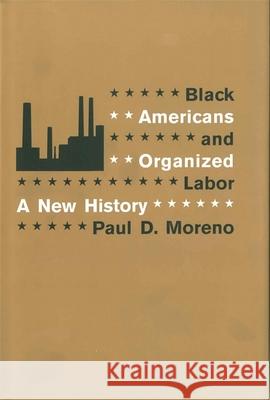Black Americans and Organized Labor: A New History » książka
Black Americans and Organized Labor: A New History
ISBN-13: 9780807133323 / Afrihili (sztuczny) / Miękka / 2008 / 360 str.
In Black Americans and Organized Labor, Paul D. Moreno offers a bold reinterpretation of the role of race and racial discrimination in the American labor movement. Moreno applies insights of the law-and-economics movement to formulate a powerfully compelling labor-race theorem of elegant simplicity: White unionists found that race was a convenient basis on which to do what unions do -- control the labor supply. Not racism pure and simple but "the economics of discrimination" explains historic black absence and under-representation in unions.
Moreno's sweeping reexamination stretches from the antebellum period to the present, integrating principal figures such as Frederick Douglass and Samuel Gompers, Isaac Myers and Booker T. Washington, and W. E. B. Du Bois and A. Philip Randolph. He traces changing attitudes and practices during the simultaneous black migration to the North and consolidation of organized labor's power, through the confusing and conflicted post-World War II period, during the course of the civil rights movement, and into the era of affirmative action. Maneuvering across a wide span of time and a broad array of issues, Moreno brings remarkable clarity to the question of the importance of race in unions. He impressively weaves together labor, policy, and African American history into a cogent, persuasive revisionist study that cannot be ignored.
Paul D. Moreno offers a bold reinterpretation-truly a "new history"-of the role of race and racial discrimination in the American labor movement. Breaking with historians deadlocked debate over the importance of race in labor organization, Moreno applies insights of the law-and-economics movement to formulate a powerfully compelling labor-race theorem of elegant simplicity: White unionists found that race was a convenient basis on which to do what unions do-control the labor supply. Not racism pure and simple but "the economics of discrimination" explains historic black absence and under-representation in unions. Morenos sweeping reexamination stretches from the antebellum period to the present, integrating relevant biographical details of principal figures such as Frederick Douglass and Samuel Gompers, Isaac Myers and Booker T. Washington, and W. E. B. Du Bois and A. Philip Randolph. Throughout, he focuses on the liberal-individualist philosophy that underlay the nineteenth-century principle of the right to work, a philosophy that the progressive or twentieth-century liberal view came to override but never fully eradicate. He traces changing attitudes and practices during the simultaneous black migration to the North and consolidation of organized labors power, through the confusing and conflicted post-World War II period, in the course of the civil rights movement, and into the era of affirmative action. Along the way, he exposes the impact of federal and state employment policies, transformations in the southern economy, the role of blacks in the cold war political economy, and the Civil Rights Act of 1964.Maneuvering across a wide span of time and a broad array of issues, Moreno brings remarkable clarity to the question of the importance of race in unions. He impressively weaves together labor, policy, and African American history into a cogent, persuasive revisionist study that cannot be ignored.











